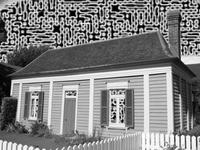June 22, 2004
PlaceLab and the MIT House_n Project
Some of the goals of the project were to use low-cost sensors, put them in real-homes quickly, and infer useful information about what was going on in the home.
In a second project, they installed a bunch of small low-cost sensors on individuals to get similar sensor streams that were body-centric.
A big challenge that they faced was ascertaining ground truth about activities that were really going on. That generated some of the work on the Context-Aware Experience Sampling Method. This is a PDA based application that interrupts the user at "appropriate" moments to ask them what they are doing. The results of the experience sampling is ground truth for the activities that were going on.
They have also developed the PlaceLab which is not a home of the future, it is not a demo house, it is a place to test new home technology on real people. It is a place to collect data and deploy new ideas on real people. It is a little like Biosphere on a small scale. (It's not to be confused with Place Lab, a Wi-Fi localization project) This condo in Boston has lots of computers, microphones, digital lighting and position sensors embedded in it.
My analysis of the project is that it is generally an interesting and valuable project. Acquiring data is a huge problem for home-based activity studies which they are addressing. So far there seems to be a lot of overhead with human subjects, building the PlaceLab, and building sensors, but not lots of results. In particular, I'm interested in the activity inference portion of their research, but I don't see a lot of results about that. (Clearly you need data before you can infer anything...)
They seem to have all the benefits and problems associated with Media Lab work. On the one hand, lots of neat ideas and design concepts that are well developed, but on the other hand a lot of commercialization, and public relations but murky communication about the new research. I always come away from learning about Media Lab stuff excited about new ideas, but empty handed as far as conclusions are concerned.
Posted by djp3 at June 22, 2004 10:34 AM | TrackBack (0)

